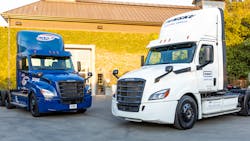Freightliner EV trucks log first 300,000 miles
Freightliner’s Innovation Fleet — a line of 30 battery-electric medium- and heavy-duty trucks — has logged more than 300,000 miles of real-world use within two years. Customers using the EVs are testing the integration of the technology into large-scale commercial transportation operations.
“Co-creation with our customers is a cornerstone of Freightliner’s unique approach to the market,” said Richard Howard, senior vice president of on-highway sales and marketing for Daimler Trucks North America. “The knowledge and expertise our logistics customers have in fleet operations with their thousands of trucks is invaluable as we design and engineer the zero-emissions future of the commercial vehicle.”
Howard added that the testing is a significant milestone for the OEM before it begins series production of battery-electric commercial trucks. The Freightliner Innovation Fleet is supported by the South Coast Air Quality Management District (South Coast AQMD), which focuses on improving air quality in the South Coast Basin of southern California. The group also partially funded the Freightliner project.
The fleet consists of 10 medium-duty eM2s and 20 heavy-duty eCascadias testing in a variety of applications, including drayage, regional and local delivery, food distribution, and parcel delivery. The 300,000 local emissions-free miles logged by the fleet is like 5,660 one-way trips between the Ports of Long Beach and Los Angeles to the warehousing centers of California's Inland Empire — or 12 trips around the globe.
DTNA unveiled both electric trucks in 2018. The eCascadia offers up to a 250-mile range and be recharged up to 80% of capacity in 90 minutes, offering an additional 200 miles of driving. The eCascadia has up to 730 peak horsepower, and the batteries provide 550 Kwh usable capacity. The eM2 offers a 230-mile range and ability to recharge to 80% in 60 minutes, providing drivers another 180 miles. It has up to 480 peak horsepower.
Among the companies Freightliner first partnered with for EV testing was Penske Truck Leasing. In August 2019, Penske received the first eCascadia from the OEM. Just a few months later, Penske announced that it already hit 10,000 miles with the first eCascadia the company deployed. Long-time Penske customer Core-Mark International, a consumer goods distributor, added the eCascadia to its fleet.
“We are in constant pursuit of industry-leading fleet technologies that offer added safety and comfort to our professional drivers, align with our focus on the environment and provide potential cost-saving advantages,” according to Brian Johnston, the senior director of transportation of Core-Mark.
The Class 8 electric vehicle is based out of Penske’s Ontario, Calif., facility. It is being used by Core-Mark to haul between 13,000 to 18,000 pounds of food and beverages to convenience stores on the outskirts of Los Angeles. Running approximately 130 miles, four days a week, the heavy-duty electric vehicle makes 10 to 12 stops daily.
“It’s exciting and rewarding to see our customers begin using these innovative electric vehicles in their operations,” said Paul Rosa, senior vice president of procurement and fleet planning at Penske Truck Leasing. “We are all collectively learning from the multitude of use cases in which we have deployed EVs and Core-Mark’s use of the vehicle are providing insights that will undoubtedly bring another level of understanding for our industry.”
A network of heavy-duty electric vehicle charging stations at six Penske Truck Leasing facilities in Southern California support the electric truck infrastructure. Penske also performs preventive maintenance at these locations.
California recently set ambitious goals to phase out diesel-powered trucks and vans in the state by the middle of the century. It starts with requiring fleets to buy more zero-emission vehicles. The California Air Resources Board (CARB) adopted the first-in-the-nation new clean-truck standard in June.
The regulations’ initial focus is on larger fleets with vehicles suitable for early electrification, those fleets’ subhaulers, and the large companies that hire them. Starting in 2024, the Golden State will limit how many diesel-powered vehicles manufacturers can sell in California. Those limitations will increase until 2045 when all new Class 2 through Class 8 vehicles sold must be zero-emission.
CARB estimates that 2 million diesel trucks cause 70% of the smog pollution in California. When announcing its decision, CARB noted that many California neighborhoods — particularly those of minorities and low-income residents — are near ports, railyards, distributions centers and other freight corridors that see the most truck traffic. The new rule, the board noted, directly addresses the pollution affecting these communities.
Freightliner plans to start series production on the eCascadia in mid-2022, followed by series production for the eM2 in late 2022.
About the Author
Josh Fisher
Editor-in-Chief
Editor-in-Chief Josh Fisher has been with FleetOwner since 2017. He covers everything from modern fleet management to operational efficiency, artificial intelligence, autonomous trucking, alternative fuels and powertrains, regulations, and emerging transportation technology. Based in Maryland, he writes the Lane Shift Ahead column about the changing North American transportation landscape.

